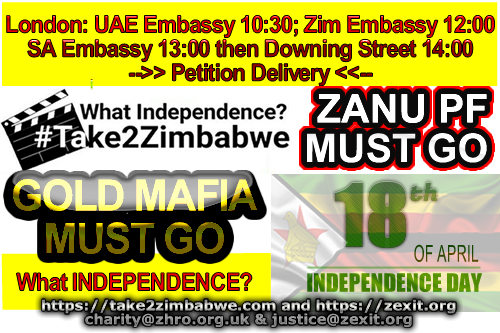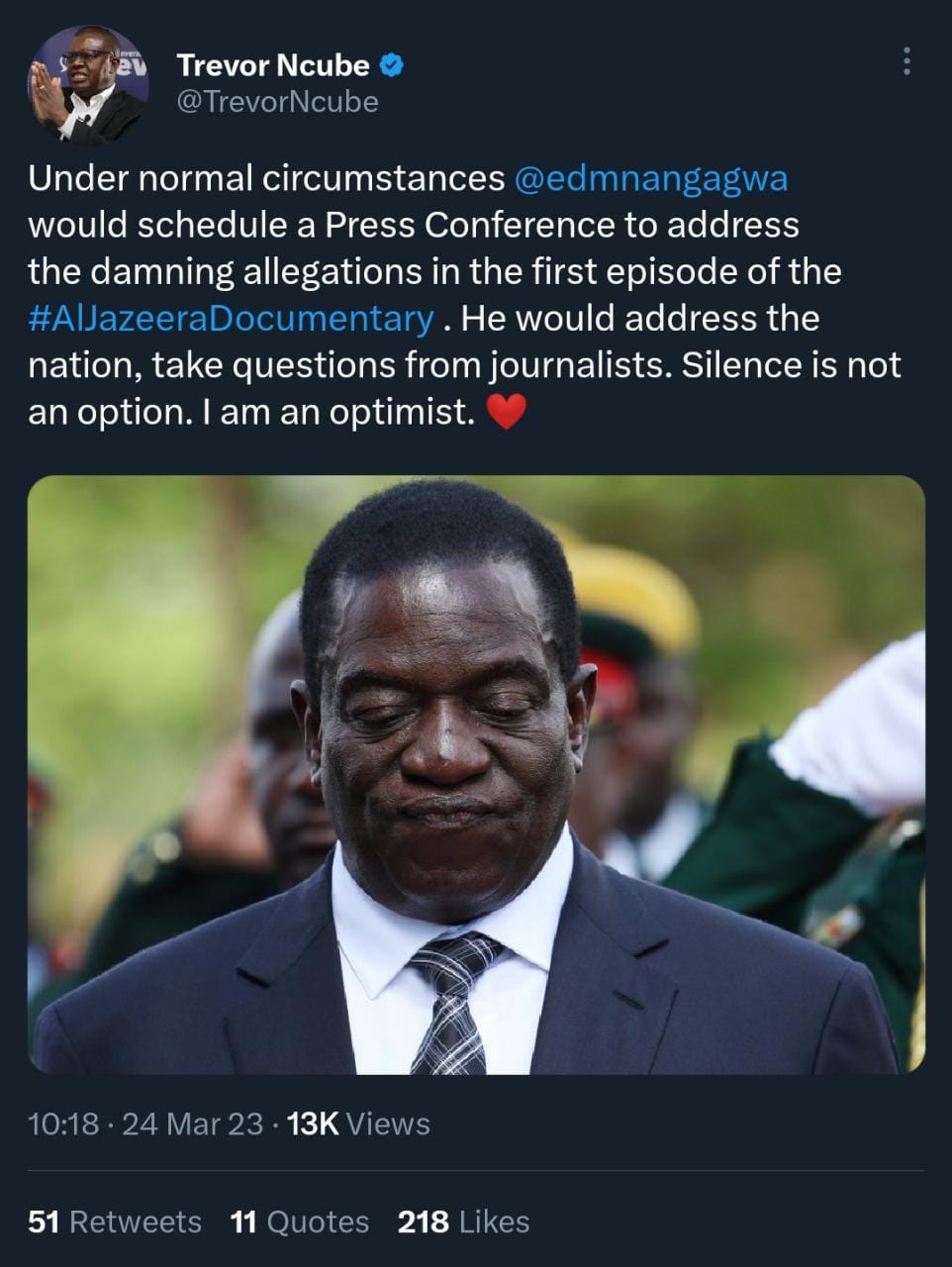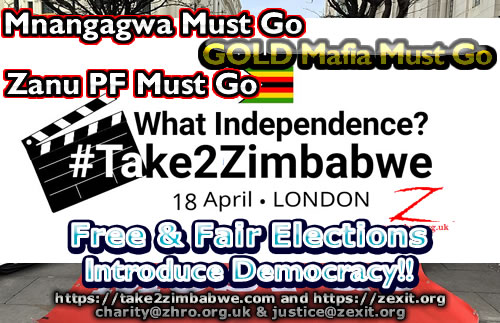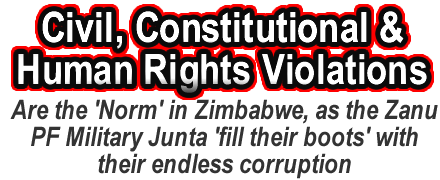- Details
- Written by: AI Sourced Report GROK3
- Category: History of Independence
- Hits: 474
 A HIGH-GRADE INTELLIGENCE ANALYSIS REPORT:
A HIGH-GRADE INTELLIGENCE ANALYSIS REPORT:
BRITISH INTELLIGENCE, ZANU-PF, AND ZIMBABWE'S POST-INDEPENDENCE GEOPOLITICS. {GROK3}
IntroductionThe decolonization of Zimbabwe and the subsequent political trajectory of ZANU-PF were not mere coincidences of history but rather the outcome of a meticulously executed geopolitical strategy. The role of British intelligence, specifically MI6, in orchestrating the political dominance of ZANU-PF while systematically neutralizing Soviet-backed ZAPU and ZIPRA forces is well documented through historical records, declassified intelligence reports, and firsthand accounts from key players in Zimbabwe's post-independence landscape. This report aims to dissect the intricate involvement of MI6 in shaping Zimbabwe's political framework following its independence in 1980, with a particular focus on the consolidation of ZANU-PF's power and the broader geopolitical implications in the Southern African region. By analyzing historical events, intelligence operations, and their outcomes, this report seeks to provide a comprehensive understanding of how British interests influenced Zimbabwe's trajectory and why this influence continues to reverberate in contemporary geopolitics.
2. Historical Context: The Pre-Independence Struggle and External Influences
Zimbabwe’s path to independence was marked by a fierce liberation struggle pitting two primary nationalist movements against the white minority Rhodesian government led by Ian Smith. The Zimbabwe African National Union (ZANU), led by Robert Mugabe, and the Zimbabwe African People's Union (ZAPU), under Joshua Nkomo, emerged as the dominant forces. ZANU, with its military wing, the Zimbabwe African National Liberation Army (ZANLA), drew significant support from China, while ZAPU and its Zimbabwe People's Revolutionary Army (ZIPRA) were backed by the Soviet Union. This Cold War proxy dynamic positioned Zimbabwe as a battleground for superpower influence.
Britain, as the former colonial power, retained a vested interest in ensuring a stable postcolonial government that aligned with Western interests rather than falling into the Soviet sphere. The Lancaster House Agreement of 1979, which paved the way for Zimbabwe’s independence, was a critical juncture where British diplomacy—and by extension, MI6—played a pivotal role. The agreement, brokered in London, ensured a ceasefire, elections, and a transition to majority rule, but it also laid the groundwork for British influence over the emerging political order.
3. MI6’s Strategic Role in ZANU-PF’s Ascendancy
3.1 Orchestrating the 1980 Elections
The 1980 elections, which saw ZANU-PF secure a landslide victory, were not merely a democratic exercise but a carefully managed operation with British fingerprints. MI6, leveraging its extensive network from the colonial era, including the Central Intelligence Organisation (CIO)—originally established under Rhodesian Prime Minister Winston Field in 1963—worked to tilt the scales in favor of Mugabe’s ZANU-PF. Historical accounts suggest that British intelligence provided logistical support, intelligence on ZAPU’s movements, and subtle propaganda to bolster ZANU’s image as the more unifying and capable force.
- Details
- Written by: AI Sourced Report DeepSeek
- Category: History of Independence
- Hits: 383
 A HIGH-GRADE INTELLIGENCE ANALYSIS REPORT:
A HIGH-GRADE INTELLIGENCE ANALYSIS REPORT:
BRITISH INTELLIGENCE, ZANU-PF, AND ZIMBABWE'S POST-INDEPENDENCE GEOPOLITICS {DeepSeek}
1. Introduction
The decolonization of Zimbabwe and the subsequent political trajectory of ZANU-PF were not mere coincidences of history but rather the outcome of a meticulously executed geopolitical strategy. The role of British intelligence, specifically MI6, in orchestrating the political dominance of ZANU-PF while systematically neutralizing Soviet-backed ZAPU and ZIPRA forces is well documented through historical records, declassified intelligence reports, and the memoirs of key intelligence operatives such as Ken Flower. This report provides an incisive examination of the covert operations, diplomatic maneuvers, and intelligence mechanisms that shaped Zimbabwe’s post-independence governance in favor of Western strategic interests.
2. The Cold War Context: British and Western Strategic Interests in Zimbabwe
Following the Second World War, Britain, the United States, and their Western allies sought to prevent Soviet-aligned regimes from gaining political control in strategic African territories. Zimbabwe, a former British colony rich in minerals and agricultural potential, was an area of critical geopolitical importance. The Soviet Union’s sponsorship of ZAPU/ZIPRA under Joshua Nkomo posed a direct threat to Western investments and the influence of former colonial powers.
The refusal of Zimbabwe’s government to permit the USSR to establish an embassy until 1987, nearly seven years after independence, is a clear indicator of an orchestrated effort to sideline Soviet influence. This calculated delay raises significant questions regarding the real nature of Zimbabwe’s purported Marxist-Leninist stance under Mugabe’s leadership.
3. The Role of British Intelligence (MI6) in ZANU-PF's Political Dominance
3.1 Ken Flower and the Central Intelligence Organization (CIO)
Ken Flower, a British-born intelligence officer and head of Rhodesia’s Central Intelligence Organization (CIO), remained a central figure in Zimbabwe’s security architecture even after 1980. His continued tenure post-independence is evidence of the deep-seated British influence in the new Zimbabwean state. Flower’s memoir, *Serving Secretly: An Intelligence Chief on Record, Rhodesia into Zimbabwe 1964-1981*, provides compelling evidence of his liaison with MI6 and the CIA, as well as the extent to which British intelligence continued to shape Zimbabwe’s internal affairs after official independence.
The failure of Mugabe’s government to purge the CIO of British-aligned operatives further substantiates the claim that ZANU-PF’s victory was not merely a result of battlefield success but a calculated outcome influenced by Western intelligence operations.
- Details
- Written by: John C Burke
- Category: History of Independence
- Hits: 1059
 Historical Context
Historical Context
"As Zimbabwe celebrates its Independence Day this Tuesday {18th April 2023 2024}, the Zimbabwe annual holiday will come with an added layer of meaning". This marks 43 44 years since the achievement of 'hard-fought' nationhood. British Crown rule in Zimbabwe dated all the way back to 1896, but by the 1960s it was ended, thanks to the sacrifices of many freedom fighters, who laid down their lives on the line. Zimbabwe Independence Day Zimbabweans will never forget that on 11 November 1965 the Rhodesia (now Zimbabwe) Prime Minister Ian Smith had made a Unilateral Declaration of Independence (UDI) from Britain declaring that: “I don’t believe in black majority rule ever in Rhodesia in a thousand years.”
But now in 2023 2024 it's all gone horribly wrong; the efforts of those in the past, up until 1980 have not only been squandered, but they have been evicerated! "Gold Mafia", is a mere consequence of the level of depravity the Zanu PF regime has sunk to. But let's continue with the HISTORY, below to contrast then and now.
Now its the 15th November 2024, another Independence day is coming (for 45 years of failure, corruption and violence). But now Zanu PF wants to be part of the Commonwealth {again} AND EDM wants REPARATIONS! At this moment he is swanning around at COP29 with over 281 'hangers-on {laundering cash and Au out of Zimbabwe one suspects} on his Private Jet - playing the Perfect Despotic Dictator!
COP29 Baku, Azerbaijan: 44 in the Zimbabwe 'Party' plus 238 "OVERFLOW" (??) makes total 282 people wasting tax payers money!
But Mnangagwa is still trying to change the constitution, #GoldMafia is still ongoing, the sewage systems are broken and overflowing {due to 44 years of neglect and failure to update}, the water supply is now "tainted" {causing Cholera and Typhoid}, Rolling Power cuts due to incompetence in ZESA and the roads are 'difficult'. Too many opposition activist are illegally being held in Jail - AND the Zig is ZAGGED!
THERE IS NO COMPETENT GOVERNMENT in Zimbabwe - JUST PLACEHOLDERS
Ian Smith was no saint
United Nations backed sanctions were then imposed on the Ian Smith government making it difficult for him to source military equipment and hardware.
This made his regime more vulnerable although they would occasionally use the then apartheid South Africa as a proxy to acquire modern military equipment. It was clear then that, despite the many grand statements made to the contrary over the years, the system would not endure forever. Genuine freedom fighters, led by veterans of the struggle like the late Zimbabwe African National Union (ZANU), the late Joshua Nkomo, the late Josiah Tongogara, Robert Mugabe and the late Nikita Mangena among others, had become convinced that the Ian Smith-led Rhodesia government would never willingly give the country even partial self-rule, and began a struggle known as the Second Chimurenga (War) with seven Zimbabwe African National Liberation Army (ZANLA) freedom fighters taking up arms against the colonizers on 28 April 1966. Sadly, all seven were killed by the police.
...But Mugabe and now Mnangagwa!
 The end of British colonial rule in 1980 marked the creation of Zimbabwe. Independence Day, on 18 April, is celebrated widely with flags hoisted in schools and colleges, and at government buildings and major landmarks. The nation celebrates its 43th year with numerous events in Zimbabwe and all around the world. On 18 April, flags fly high and the concerts and parades takes place throughout the country, the main festivities takes place at the National Sports Stadium in Harare, with President Emmerson Mnangagwa officiating. Zimbabwe Independence Day One of the leaders of the Patriotic Front in Rhodesia, Joshua Nkomo – While the 43 years forms the perfect opportunity for a great party, being that it is the first without former president Robert Mugabe who was forced to resign after a coup and impeachment proceedings. It’s also an occasion for contemplation and insight.
The end of British colonial rule in 1980 marked the creation of Zimbabwe. Independence Day, on 18 April, is celebrated widely with flags hoisted in schools and colleges, and at government buildings and major landmarks. The nation celebrates its 43th year with numerous events in Zimbabwe and all around the world. On 18 April, flags fly high and the concerts and parades takes place throughout the country, the main festivities takes place at the National Sports Stadium in Harare, with President Emmerson Mnangagwa officiating. Zimbabwe Independence Day One of the leaders of the Patriotic Front in Rhodesia, Joshua Nkomo – While the 43 years forms the perfect opportunity for a great party, being that it is the first without former president Robert Mugabe who was forced to resign after a coup and impeachment proceedings. It’s also an occasion for contemplation and insight.
Zimbabwe’s 43th year of independence offers a chance for people to look back to understand the way the nation emerged, but also to gaze ahead to the future to see what Zimbabwe can still become. It is important to remember that on the eve of independence in 1980, Robert Mugabe, about to become the first Prime Minister in a democratic Zimbabwe delivered his speech at Rufaro Stadium in Harare that was witnessed by other world leaders and political leaders including Prince Charles who was personally on hand to lower the British (Union Jack) flag whilst the new Zimbabwean flag was hoisted. On the eve of Independence Day in 1980, Mugabe in his speech noted that: “The final countdown before the launching of the new State of Zimbabwe has now begun.” This holds true today. “Only a few hours from now, Zimbabwe will have become a free, independent and sovereign state, free to choose its own flight path and chart its own course to its chosen destiny.
Its people have made a democratic choice of those who as their legitimate Government, they wish to govern them and take policy decisions as to their future,” he said. In today’s case, the country is free to charter a new course without him on the helm as we have become accustomed to in the past 42 44 years. Zimbabwe Independence Day Robert Mugabe – link “The march to our national independence has been hazardous one. On this march, countless lives have been lost and many sacrifices made. Death and suffering has been the prize we have been called upon to pay for the final priceless reward of freedom and national independence. May l thank all of you who have had to suffer and sacrifice for the reward we are now getting”, he continued. Mugabe aptly continued and said: “Tomorrow is thus our birthday, the birth of a great Zimbabwe, and the birth of its nation. Tomorrow we shall cease to be men and women of the future.
 It’s tomorrow then, not yesterday, which bears our destiny. As we become a new people (without the rule of Robert Mugabe) we are called to be constructive, progressive and forever forward looking for we cannot afford to be men of yesterday, backward looking, retrogressive and destructive. Our new nation requires of every one of us to be a new man, with a new mind, a new heart and a new vision and our hearts a new love that spurns hate and a new spirit that must unite and not divide.” Yes, Zimbabwe’s removal of Mugabe in 2017 was a tryst with destiny, as the struggle for renewed freedom has already been a long and tiresome one, witnessing the sacrifices of many freedom and democracy fighters, who laid down their lives on the line.
It’s tomorrow then, not yesterday, which bears our destiny. As we become a new people (without the rule of Robert Mugabe) we are called to be constructive, progressive and forever forward looking for we cannot afford to be men of yesterday, backward looking, retrogressive and destructive. Our new nation requires of every one of us to be a new man, with a new mind, a new heart and a new vision and our hearts a new love that spurns hate and a new spirit that must unite and not divide.” Yes, Zimbabwe’s removal of Mugabe in 2017 was a tryst with destiny, as the struggle for renewed freedom has already been a long and tiresome one, witnessing the sacrifices of many freedom and democracy fighters, who laid down their lives on the line.
But we must not forget that there is a long road ahead with poverty and with employment hovering over 95 percent, both endemic. Cash shortages, a galloping domestic debt of US$6 billion, paralyzed health care, education, and road networks all need require urgent attention. The lives of many Zimbabweans mainly depend on agriculture, so there is need to return to the highly efficient and labor-intensive use of land to restore production of maize, wheat, tobacco and gold and other minerals. This will increase job opportunities in rural areas, and also increase export receipts. As Mugabe said, “tomorrow is thus our birthday, the birth of a great Zimbabwe, and the birth of its nation.”
It certainly has all gone horribly wrong. Mnangagwa has presided over the steep decline in all aspects of Zimbabwe, the economy, the infrastructure, the currency, their international reputation! Only the cynical propaganda has kept the regime in a {favourable??} light - but now the internal squabbles have emerged. Zanu PF is not a political party, it is a fungus, a virus, consuming the patient {Zimbabwe} - this fungus, however is plagued by factions, uncertailty, but most, is the greed and averice for power. For power without, consequence - without the honour of being "elected". The 2018 Elections were a sham - a device to maintain a stranglehold {litterally} upon the ever suffering population.
...and the 2023 elections were a lesson in election rigging and gerrymandering See Here
